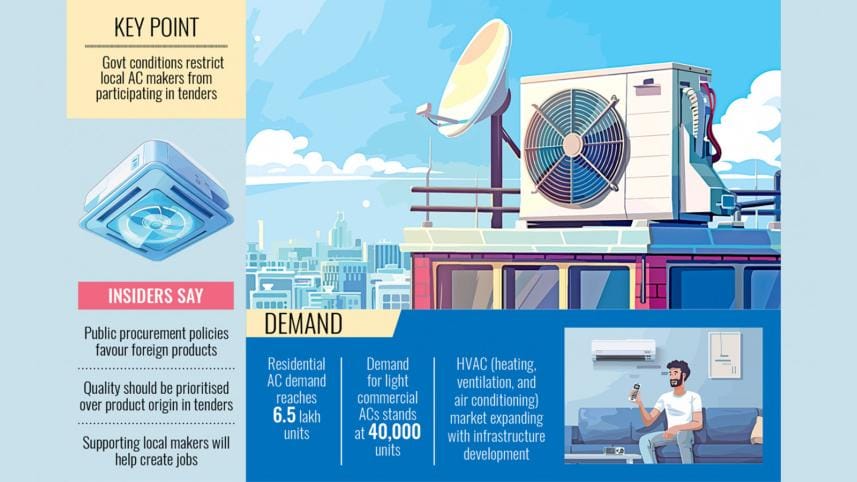Local AC industry seeks ‘fair’ govt procurement policy

Local air conditioner (AC) manufacturers in Bangladesh are pushing for "fair" government procurement policies, arguing that existing rules favour foreign brands despite local companies meeting global standards.
They urge the authorities to prioritise quality over origin.
According to industry insiders, around 6 to 6.5 lakh residential ACs are sold every year.
Moreover, there is a demand for around 40,000 units of light commercial ACs, including cassette and ceiling-type units.
Meanwhile, there is also significant demand for heating, ventilation, and air conditioning (HVAC) solutions, comprising variable refrigerant flow and chiller systems, for large spaces.
Generally, pricing for government purchases is determined based on the Harmonised System code, a standardised international numerical method of classifying products. However, industry insiders argue that this system does not always provide a level playing field for local companies.
Currently, the government procures products through various policies that align with international standards, following the schedule of rates set by the Public Works Department.
According to industry insiders, many local manufacturers, including Walton, Transtec, Gree, Singer, and Midea, adhere to these standards and have acquired the necessary certifications.
Some have even secured international quality certifications, ensuring their products are competitive with imported alternatives.
Despite these achievements, local manufacturers face hurdles due to procurement policies that sometimes specify the country of origin rather than focusing solely on product quality and specifications.
"If the government provides clear and specific guidelines, we will be able to manufacture products accordingly," said Md Tanvir Rahman, chief business officer of Walton Air Conditioner.
"However, if procurement decisions are made solely based on the country of origin, it creates an unnecessary barrier for domestic producers," Rahman said.
He said public procurement in Bangladesh was governed by the Public Procurement Act, which mandates that purchases be made based on quality rather than specifying particular countries.
However, in practice, he said, many tenders still include specific country requirements, contradicting the intent of the law. This restriction prevents local manufacturers from competing fairly in government projects, he added. Despite controlling around 90 percent of the local AC market, domestic manufacturers struggle to secure government contracts, he said.
"We are not asking for undue preference. We only seek fair participation in government tenders," said Rahman.
He also stressed that prioritising high-quality domestic products over foreign alternatives would not only strengthen the local industry but also boost employment and economic growth.
Salim Ullah, director (marketing) of Jamuna Electronics, said government entities impose certain conditions that prevent local manufacturers from participating in government tenders.
He stated that these entities specify certain product requirements that local electronic manufacturers cannot fulfil under the open tender method.
He claimed that local manufacturers have already met global standards for TVs, air conditioners, refrigerators, and other electronic appliances.
"We, the local manufacturers, cater to 80 percent of the demand for electronic home appliances across the country, while the remaining 20 percent is met by multinational companies," he pointed out.
However, he said, local manufacturers rarely supply government entities, as these entities follow the direct procurement method.
Md Nurul Afser, deputy managing director of Electro Mart, said government procurement entities usually do not prefer locally manufactured electronic items, as they explicitly mention the country of origin.
For this reason, there is limited opportunity to participate in government tenders, he said.
He emphasised the need to prioritise local manufacturers by ensuring they meet the required standards, as this would be cost-effective and help save foreign exchange.
With Bangladesh's AC industry reaching new heights, ensuring fair procurement policies will be crucial in maintaining growth and sustaining local manufacturing capabilities, Afser suggested.
Md Nasim Khan, additional chief engineer of the Public Works Department (PWD), Dhaka Metropolitan Zone, said the allegations made by local electronics manufacturers do not apply to all government entities, as procurement criteria vary from one entity to another.
According to him, there is no mandatory requirement to follow the PWD criteria. Rather, most public procurement entities set their own criteria based on public procurement rules (PPR).
He also stated that PPR 2008 emphasises supporting local manufacturers to protect domestic companies.
Md Aynal Haque, professor of the electronics and electrical engineering department at the Bangladesh University of Engineering and Technology (Buet), stated that local electronic manufacturers have achieved a certain level of standard.
Therefore, the government should allow them to participate in government tenders, he said.
He also suggested that the time has come to revise the conditions of the rate schedule of the PWD so that local electronic manufacturers can take part in tenders.
If there is a requirement for standard and quality checks, the procurement entities can have them tested at the Buet lab, he noted.





 For all latest news, follow The Daily Star's Google News channel.
For all latest news, follow The Daily Star's Google News channel.
Comments